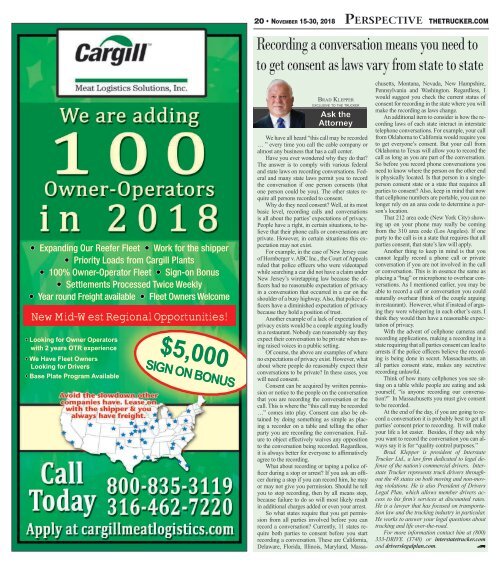The Trucker Newspaper - November 15, 2018
Create successful ePaper yourself
Turn your PDF publications into a flip-book with our unique Google optimized e-Paper software.
• Expanding Our Reefer Fleet • Work for the shipper<br />
• Priority Loads from Cargill Plants<br />
• 100% Owner-Operator Fleet • Sign-on Bonus<br />
• Settlements Processed Twice Weekly<br />
• Year round Freight available • Fleet Owners Welcome<br />
New Mid-West Regional Opportunities!<br />
• Looking for Owner Operators<br />
with 2 years OTR experience<br />
• We Have Fleet Owners<br />
Looking for Drivers<br />
• Base Plate Program Available<br />
$5,000<br />
Sign On BOnuS<br />
20 • <strong>November</strong> <strong>15</strong>-30, <strong>2018</strong> Perspective THETRUCKER.COM<br />
Recording a conversation means you need to<br />
to get consent as laws vary from state to state<br />
Brad Klepper<br />
exclusive to the trucker<br />
Ask the<br />
Attorney<br />
We have all heard “this call may be recorded<br />
… ” every time you call the cable company or<br />
almost any business that has a call center.<br />
Have you ever wondered why they do that?<br />
<strong>The</strong> answer is to comply with various federal<br />
and state laws on recording conversations. Federal<br />
and many state laws permit you to record<br />
the conversation if one person consents (that<br />
one person could be you). <strong>The</strong> other states require<br />
all persons recorded to consent.<br />
Why do they need consent? Well, at its most<br />
basic level, recording calls and conversations<br />
is all about the parties’ expectations of privacy.<br />
People have a right, in certain situations, to believe<br />
that their phone calls or conversations are<br />
private. However, in certain situations this expectation<br />
may not exist.<br />
For example, in the case of New Jersey case<br />
of Hornberger v. ABC Inc., the Court of Appeals<br />
ruled that police officers who were videotaped<br />
while searching a car did not have a claim under<br />
New Jersey’s wiretapping law because the officers<br />
had no reasonable expectation of privacy<br />
in a conversation that occurred in a car on the<br />
shoulder of a busy highway. Also, that police officers<br />
have a diminished expectation of privacy<br />
because they hold a position of trust.<br />
Another example of a lack of expectation of<br />
privacy exists would be a couple arguing loudly<br />
in a restaurant. Nobody can reasonably say they<br />
expect their conversation to be private when using<br />
raised voices in a public setting.<br />
Of course, the above are examples of where<br />
no expectations of privacy exist. However, what<br />
about where people do reasonably expect their<br />
conversations to be private? In these cases, you<br />
will need consent.<br />
Consent can be acquired by written permission<br />
or notice to the people on the conversation<br />
that you are recording the conversation or the<br />
call. This is where the “this call may be recorded<br />
…” comes into play. Consent can also be obtained<br />
by doing something as simple as placing<br />
a recorder on a table and telling the other<br />
party you are recording the conversation. Failure<br />
to object effectively waives any opposition<br />
to the conversation being recorded. Regardless,<br />
it is always better for everyone to affirmatively<br />
agree to the recording.<br />
What about recording or taping a police officer<br />
during a stop or arrest? If you ask an officer<br />
during a stop if you can record him, he may<br />
or may not give you permission. Should he tell<br />
you to stop recording, then by all means stop,<br />
because failure to do so will most likely result<br />
in additional charges added or even your arrest.<br />
So what states require that you get permission<br />
from all parties involved before you can<br />
record a conversation? Currently, 11 states require<br />
both parties to consent before you start<br />
recording a conversation. <strong>The</strong>se are California,<br />
Delaware, Florida, Illinois, Maryland, Massachusetts,<br />
Montana, Nevada, New Hampshire,<br />
Pennsylvania and Washington. Regardless, I<br />
would suggest you check the current status of<br />
consent for recording in the state where you will<br />
make the recording as laws change.<br />
An additional item to consider is how the recording<br />
laws of each state interact in interstate<br />
telephone conversations. For example, your call<br />
from Oklahoma to California would require you<br />
to get everyone’s consent. But your call from<br />
Oklahoma to Texas will allow you to record the<br />
call as long as you are part of the conversation.<br />
So before you record phone conversations you<br />
need to know where the person on the other end<br />
is physically located. Is that person in a singleperson<br />
consent state or a state that requires all<br />
parties to consent? Also, keep in mind that now<br />
that cellphone numbers are portable, you can no<br />
longer rely on an area code to determine a person’s<br />
location.<br />
That 212 area code (New York City) showing<br />
up on your phone may really be coming<br />
from the 310 area code (Los Angeles). If one<br />
party to the call is in a state that requires that all<br />
parties consent, that state’s law will apply.<br />
Another thing to keep in mind is that you<br />
cannot legally record a phone call or private<br />
conversation if you are not involved in the call<br />
or conversation. This is in essence the same as<br />
placing a “bug” or microphone to overhear conversations.<br />
As I mentioned earlier, you may be<br />
able to record a call or conversation you could<br />
naturally overhear (think of the couple arguing<br />
in restaurant). However, what if instead of arguing<br />
they were whispering in each other’s ears. I<br />
think they would then have a reasonable expectation<br />
of privacy.<br />
With the advent of cellphone cameras and<br />
recording applications, making a recording in a<br />
state requiring that all parties consent can lead to<br />
arrests if the police officers believe the recording<br />
is being done in secret. Massachusetts, an<br />
all parties consent state, makes any secretive<br />
recording unlawful.<br />
Think of how many cellphones you see sitting<br />
on a table while people are eating and ask<br />
yourself, “is anyone recording our conversation?”<br />
In Massachusetts you must give consent<br />
to be recorded.<br />
At the end of the day, if you are going to record<br />
a conversation it is probably best to get all<br />
parties’ consent prior to recording. It will make<br />
your life a lot easier. Besides, if they ask why<br />
you want to record the conversation you can always<br />
say it is for “quality control purposes.”<br />
Brad. Klepper is president of Interstate<br />
<strong>Trucker</strong> Ltd., a law firm dedicated to legal defense<br />
of the nation’s commercial drivers. Interstate<br />
<strong>Trucker</strong> represents truck drivers throughout<br />
the 48 states on both moving and non-moving<br />
violations. He is also President of Drivers<br />
Legal Plan, which allows member drivers access<br />
to his firm’s services at discounted rates.<br />
He is a lawyer that has focused on transportation<br />
law and the trucking industry in particular.<br />
He works to answer your legal questions about<br />
trucking and life over-the-road.<br />
For more information contact him at (800)<br />
333-DRIVE (3748) or interstatetrucker.com<br />
and driverslegalplan.com. 8

















